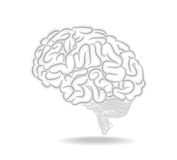The Role of Memory in Mathematical Ability
» Lessons from neuroscience on how memorizing pi may have broader benefits for the teaching & learning of math
How does memory interact with mathematical ability? Is memory an improvable skill or a limited resource? Is there potential cognitive value to be derived from digit memorization, which could, in turn, influence a student’s success in the mathematics classroom?
Or, in short, is all this digit memorizing just for laughs, or could it actually make kids better at math?
In 2011, TeachPi.org founder Luke Anderson devoted a semester of his graduate studies at Harvard to these questions, and the resulting answers were intriguing for educators and memorists alike. Luke is not a neuroscientist, mind you, and he assembled this research for a course project and not for submission to an academic journal. But with that caveat in mind, he synthesized current scientific findings on the intersection of memory and the learning of mathematics to make a compelling case for the cognitive and educational value of memorizing pi.
If this whets your appetite and you have the time and inclination to read Luke’s 5,000-word article in full, you are more than welcome to do so! Here it is! (PDF) Or, you can start by reading’s the article’s abstract below.
“How does memory interact with mathematical ability? Is memory an improvable skill or a limited resource? Is there potential cognitive value to be derived from digit memorization, which could, in turn, influence a student’s success in the mathematics classroom? The author establishes the narrative that developing the skill of digit memorization improves working memory, a critical contributor to mathematical performance, by enhancing its ability to engage in retrieval from long-term memory. He then posits a competing narrative which presents memory as a limited resource that should be employed pragmatically in mathematical problem solving, and compensated for, when necessary, by other available strategies. He ultimately argues for an understanding of the role of memory in mathematical ability that affords a measure of educational legitimacy to the popular but peculiar activity of memorizing the digits of pi.”
Read the full article here.
Key Takeaways for Teachers
If you’d rather cut to the chase and ask, “What’s in it for my students?”, then consider the following suggested classroom activities that arise from the article:
Exercise your students’ working memory muscles.
Engage your students in tasks that seek to build their working memory. Working memory is, in simple terms, our brain’s temporary storage mechanism, where we hold several pieces of information for processing and assembling in the coming moments. We use it all the time in daily life, but math students use it when, say, borrowing numbers in subtraction.
Luke’s article states that digit memorization is a way of improving working memory by enhancing the mechanism’s ability to retrieve things from long-term memory. Working memory itself is strongly tied to mathematical performance. So, how might you improve working memory in your students? We’ll leave that to a few writers far more expert on the subject:
Find 8 very simple tips to boost a child’s working memory in this article at understood.com.
Find 5 strategies for building working memory through and for math in this article at learningworksforkids.com.
And for an in-depth discussion of combating poor working memory, see this article from the Yale Center for Dyslexia and Creativity.
Make time for hands-free math.
From Luke’s article:
In an age where calculators appear on every personal electronic device, it may be easy to overlook the value of developing mental calculation techniques and of adding to the store of basic facts that stand ready to be accessed in long-term memory. Likewise, the focus on acquisition of manual written procedures, like long division techniques, should be assessed with respect to their contribution to a student’s lasting skill set and his cognitive development. … [M]ental problem solving, in both calculation and retrieval modes, is a skill whose development will have an enduring impact.
Consider trying any of the plentiful “math magic” and mental-math resources or videos you may find around the Web – even the ones that seem silly and far-fetched!
Practice ‘skilled memory’ beyond just Pi.
From Luke’s article:
[T]eachers should encourage in their students the pursuit of skilled memory. Digit memorization need not confined to Pi Day; they can start very practically by presenting a 2-by-2 grid of numbers for a few seconds, and then asking the class to transcribe it from memory. Over time, they can build to grids of 3-by-3 and even 4-by-4. Increasingly challenging digit span tasks, as they begin to exceed the limits of pure short-term memory, will spur students’ development of both meaningful encoding and retrieval structures.
Teachers can foster meaningful encoding directly by encouraging students to memorize numbers that have personal meaning to them, like the jersey numbers and statistics of their favorite athletes, or the birthdays of their friends and relatives. The student whose dramatic increase in digit span provided Ericsson et al. (1980) one of their earliest glimpses of the skilled memory framework was a runner, and they found that the majority of his mnemonic associations were based on running times for various races.
Systematic retrieval of these encoded subgroups will soon follow, as seen in the approach of Sierra Van Such, who recited an astounding 1,266 digits of pi in the 7th grade: “I just take little groups of numbers and try to find patterns in the big numbers and then just keep putting them together” (Newport, 2011). With practice, students will begin to develop a skilled memory, and to reap the cognitive and educational rewards.
On a day far from March 14, ask your students to show up the next day with as many numbers memorized, relating to one of their hobbies or favorite things, as they can!


